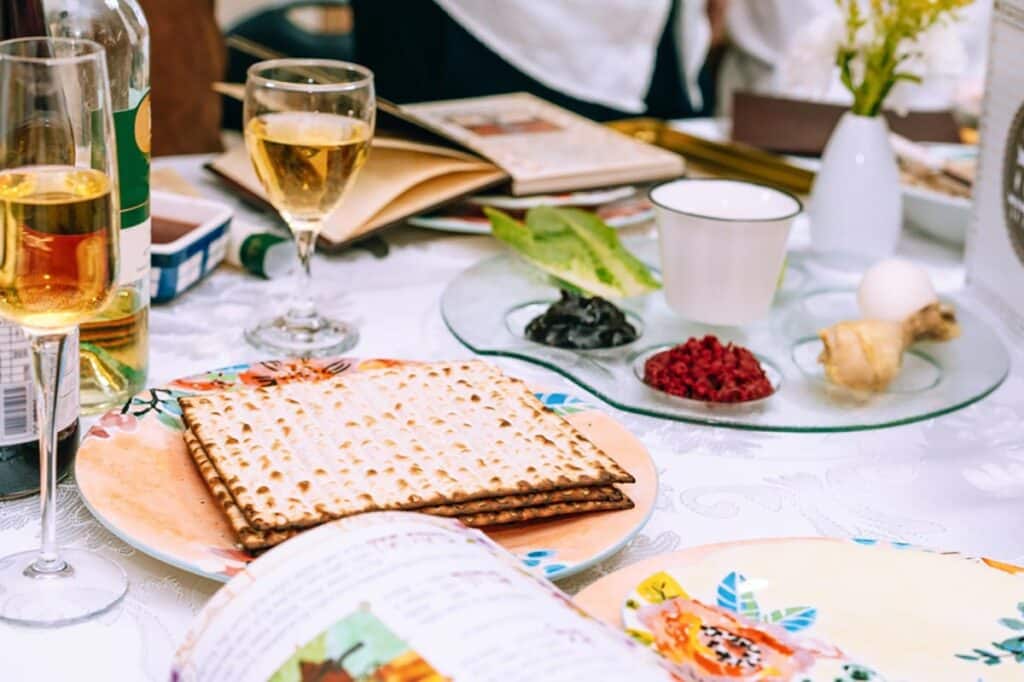In case you didn’t recognize that voice–and chances are you didn’t—that was legendary Detroit Tigers Hall of Fame radio announcer Ernie Harwell with his annual words to begin the very first broadcast of the season on Opening Day. Growing up in southeastern Michigan, hearing the voice of Ernie calling games from Tiger Stadium in April was a sure sign that, after a long winter, spring had finally sprung. It was time to play ball.

Then as now, Passover always seems to come around Opening Day. And there’s a reason for that: The Torah says that, while Jews measure the year by a lunar calendar–which only has 354 days per year–-we have to celebrate Passover in the spring, because that’s the season when our ancestors left Egypt. So even though the date moves around from year to year, every couple of years we add a month to the Jewish calendar to make sure that Passover stays aligned with the baseball season… er, with the springtime.
Spring is a time of renewal—think spring cleaning; it’s a time for getting back outdoors, going to sporting events, seeing our neighbors; it’s the season of prom dances and teenage romance. It’s the season of freedom. In the words of John Lennon, here comes the sun, and I say it’s all right.
To stick with the pop culture references from my youth for one more minute, I’ll confess that when I think about freedom, one of the songs my mind goes to is George Michael’s “Freedom” from 1990. If you were alive then, you might remember it. Here’s a clip:
For some of you younger listeners, you might not know that George Michael coming out as gay was an enormous deal in the late 1990s. Listening to Freedom now, it sounds like he was preparing himself and the world for sharing his truth—he was getting ready to be honest about his life.
That’s one really essential aspect of freedom. And we can find a connection to it in the Passover story. Our ancestors, the ancient Israelites, needed to get honest about who they were: they weren’t the property of the Egyptians, they weren’t anybody’s property—”I don’t belong to you, and you don’t belong to me” in George Michael’s words. Instead, they had to get used to the idea that, if they were anybody’s property, they were God’s property. In fact, in the Torah’s own words, we can understand that that’s what the Exodus was all about: moving from being avdei Paro, servants of Pharaoh, to, as God puts it in the book of Leviticus, avadai, My servants, servants of the Holy One.
So up to that point, I think we should be singing George Michael alongside Chad Gadya at the seder. But I’m gonna be honest and say I’ve got a quibble with that very same verse of the song: Because in some ways, I feel like I do belong to you, and you do belong to me—not in an ownership sense, but definitely in a mutual responsibility sense.
The Talmud has a famous line, kol yisrael arevin zeh bazeh, which means that the people of Israel are responsible for one another. The Torah reminds us over and over again to remember that we were enslaved in Egypt, that we were strangers—and because of that, we should be looking out for one another and taking care of people on the margins of society: people who are poor, hungry, powerless, parentless, without safe homes to live in, unsafe. If you can’t be safe, it’s hard to be free. So our freedom–the title of George Michael’s song and the essence of Passover—is not just about independence, but also healthy mutual dependence.
As Passover approaches this year, I want to really invite and encourage you to deepen your own experience of this paradox: to reflect on the ways you might need to become more independent—and also to consider the ways you might deepen your awareness and practice of mutual dependence and responsibility.
Here’s a short meditation that can help.
Begin by taking three good deep breaths.
If you can, gently close your eyes.
Allow your attention to come to rest on your breath.
And perhaps just take a moment to feel a sense of pleasure in it: the sensation of breathing itself, freely given by the plant world to us.
Just take it in and enjoy it.
And maybe allow yourself to recognize that no one can take this from you. This breath of life—you are able to take it.
You have this most basic element of freedom.
You are a servant of the Divine, and no one else.
As you exhale, allow yourself to consider the trees and plants you’re feeding with the carbon dioxide coming out of you. Just as they gave you a gift on the inhale, you’re returning the gift to them with your exhale.
Sit with that for a few breaths: sensing this web that connects us.
We are all breathing in the air of freedom, and we’re breathing it back out into the world.
Your breath, and my breath, and the breath of everyone listening right now, and everyone else on the planet—we are all breathing in the air of freedom, and breathing it back out to all other beings.
I don’t belong to you, and you don’t belong to me. But also, I do belong to you, and you do belong to me. This is the beautiful mystery we live with every single breath of our lives.
Blessings for the journey. Know that I’m on it with you.